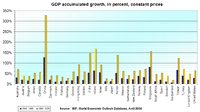
Photo from wikipedia
The critical role of electricity consumption in influencing and reshaping the economic and environmental landscape of the global economy cannot be underestimated. Electricity is the most beneficial and commonly transformed… Click to show full abstract
The critical role of electricity consumption in influencing and reshaping the economic and environmental landscape of the global economy cannot be underestimated. Electricity is the most beneficial and commonly transformed energy source; however, the strength, weakness, opportunities and threat of its consumption require scientific scrutiny. This study investigates electricity-led growth hypothesis vis-à-vis its impact on economic growth and environmental quality of Turkey. The annual time series data set from 1970 to 2014 were employed in the analysis with a battery of unit root and stationary tests. The equilibrium relationship in the study is explored using Maki and Bayer-Hanck combined cointegration tests under multiple structural breaks along with the Pesaran’s ARDL bounds test procedure for robust check. The study confirms the existence of cointegration relationship between electricity consumption, economic growth, capital, labour and ecological footprint. To detect the direction of causal relations, the VECM Granger causality test is employed. The causality analysis provides empirical evidence that supports the electricity-induced growth hypothesis in Turkey. This implies that embarking on conservative energy-efficient policies will slow down Turkey’s economic growth. Thus, precautionary measures that ensure adequate policy on energy mix to guarantee availability and accessibility to modern electricity will sustain economic growth and improve environmental sustainability.
Journal Title: Environmental Science and Pollution Research
Year Published: 2020
Link to full text (if available)
Share on Social Media: Sign Up to like & get
recommendations!